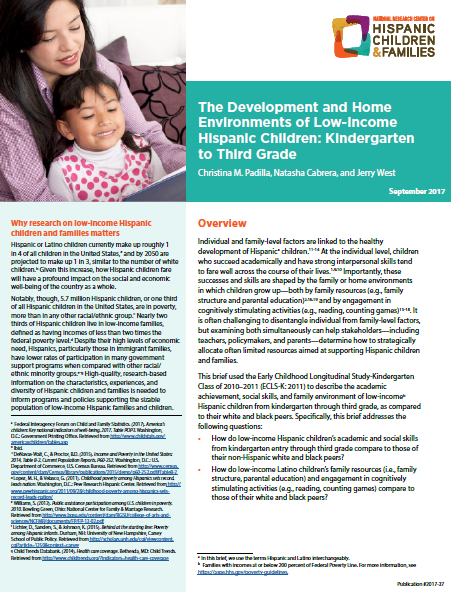Sep 29, 2021
Research Publication
Latino Parents Report Positive Co-parenting and Parent-Child Interactions that Vary by Gender and Nativity
Authors:
The effectiveness of programs aimed at improving relationship outcomes relies in large part on their ability to meet participant needs and offer services that participants feel are useful to them. Understanding the needs of mothers and fathers signing up for these services and gaining insight into their relationships with their children and with each other as parents can help programs to allocate resources and offer targeted supports that correspond with participants lived experiences.
For Latino families, research has found that Latinos born in the United States have different resources and views about their co-parenting in comparison with Latino parents who are born elsewhere and immigrated to the United States. To support program staff and researchers in understanding and addressing program client needs, this brief uses data from the Supporting Healthy Marriage (SHM) evaluation to provide information about the co-parenting and parenting relationships of low-income, married Latino fathers and Latina mothers seeking programmatic services to improve their relationship outcomes by answering the following questions:
- What is the quality of their co-parenting relationship (i.e., cooperation and conflict)?
- What are their parenting practices (i.e., parent involvement and discipline), parenting quality (e.g., warmth), and parenting stress and do these vary by their children’s age?
- How do mothers’ and fathers’ co-parenting and parent-child relationships vary by nativity status?
Findings
The findings of the brief indicate that co-parenting relationships are generally strong among Latinos, providing evidence to the view that Latino parents raise their children in a supportive and positive environment. However, the strength of co-parenting relationships varies by nativity, while parenting practices vary by both gender and nativity. The study found the following:
- Overall, Latino fathers and mothers agree that they have a cooperative coparenting relationship and rarely experience conflict.
- Immigrant Latino fathers show a more positive perception than immigrant Latina mothers of their co-parenting relationship, whereas there was no difference for U.S.-born Latino co-parents.
- A lower percentage of immigrant Latino fathers and mothers report getting along “very well” in comparison to their U.S.-born counterparts, with immigrant fathers reporting more conflict with their partner than U.S.-born fathers.
- Overall, Latino fathers and mothers report high levels of involvement with their children and regularly expressing warmth toward them.
- Latino fathers and mothers report rarely using harsh discipline (i.e., spanking or hitting) and low levels of parenting stress (i.e., strongly disagreed that parenting is more work than pleasure).
- Latino fathers report being less warm and involved with their children than Latina mothers. However, immigrant fathers report using verbal and hard discipline less often than immigrant mothers.
- Immigrant Latino fathers report being less involved with their younger children and using verbal and harsh discipline less often than fathers born in the United States.
- Immigrant Latina mothers report slightly less involvement (i.e., a few times a week) with their younger children than mothers born in the United States; and
- Immigrant Latina mothers report higher levels of parenting stress than U.S.-born mothers.
Take-home messages
For researchers and program administrators, these findings offer numerous take-home messages to enhance programmatic parenting and co-parenting relationship services for Latino families. Specifically, this brief provides the following recommendations:
- Programs that aim to strengthen co-parent relationships may serve a preventive function and may help families maintain healthy and positive relationships as they and their children age, and as they face life’s challenges—making them a valuable investment.
- Programs can maximize effectiveness for families by carefully tailoring services to specifically meet family needs.
- Programs can use positive findings to acknowledge, validate, and support current practices.
- Programs can do more to help fathers and mothers become more aware of their partners’ needs and be more supportive as co-parents, especially for immigrant parents who, in general, reported more discordance in their perception of their relationships.
- HMRE programs serving low-income married couples could be enhanced by increasing practitioners’ awareness that fathers and mothers have different needs and different perceptions of the types of relationship support and help they need.
Suggested Citation
Cabrera, N., Chen, Y., Alonso, A., West, J., & Fagan, J. (2021). Latino Parents Report Positive Co-parenting and Parent-Child Interactions that Vary by Gender and Nativity. Report 2021-04. Bethesda, MD: National Research Center on Hispanic Children & Families. Retrieved from www.hispanicresearchcenter.org/research-resources/Latino-Parents-Report-Positive-Co-parenting-and-Parent-Child-Interactions-that-Vary-by-Gender-and-Nativity.







